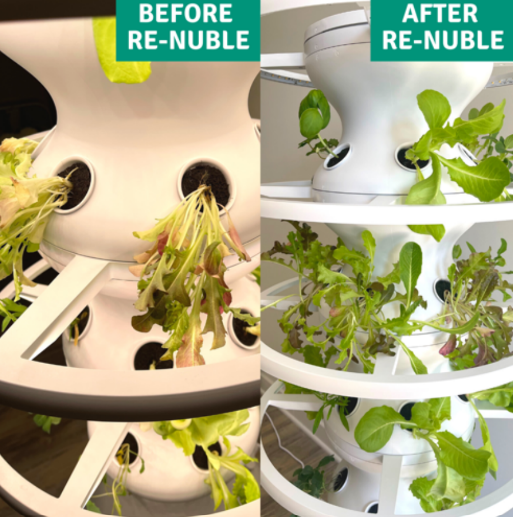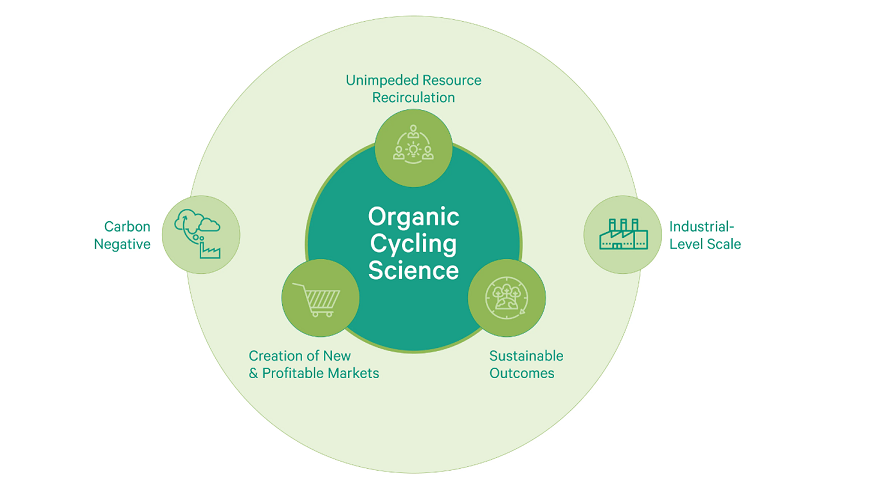Re-Nuble is a circular economy solution that takes waste byproducts and turns them into valuable nutrients that help crops grow.
The agricultural industry, including indoor farming, requires a substantial amount of nutrients to sustain our food chain. These nutrients can come in the form of fertilizers, both organic and non-organic. Unfortunately, these nutrients generate substantial emissions as they travel across the entire supply chain - from production to farm to table to landfill.
Organic waste is a surprising contributor to carbon emissions, generating the equivalent of 170 million metric ton each year1. This type of waste includes items such as food, yard waste, biosolids, and more. In addition to being environmentally unfriendly, organic waste can also be expensive. In fact, $186 million is put towards waste management annually that could be easily avoided with the proper composting and infrastructure.
On the flip side, non-organic waste is also a large contributor to global emissions. Within agriculture, outputs of the non-organic fertilizer-synthetic mineral salts manufacturing process contribute about 47.5% in total to global greenhouse gas emissions2. This percentage is measured by accounting for agriculture, livestock, and emissions from synthetic mineral salts themselves. Synthetic mineral salts are a popular choice of farmers as they are easily water soluble, which allows the plant to easily access nutrients. Synthetic mineral salts are however, not locally made, emit substantial amounts of heat, and use petroleum sources. The alternative- farming with organic inputs, can also produce biofilm, which will impact overall water quality.
Re-Nuble is a company that aims to help indoor farmers increase their yields while also avoiding the excess outputs and inputs of synthetic mineral salts that release heat and waste into the environment. Re-Nuble offers an alternative to synthetic mineral salts, while also avoiding the harmful water quality impacts of typical organic methods such as biofilm. The company sources and sterilizes vegetative waste from certifiable actors in the food industry, diverting organic waste that would otherwise have ended up in landfills. The company then composts the items and transforms them into organic hydroponic nutrients that can be used by indoor growers. These nutrients are key to improving the performance of the crops, as shown in the photo below.

The company produces a number of sustainable products for indoor growing including:
- Away We Grow 4-1-1- Concentrate - water-soluble, liquid organic hydroponic nutrients that are sourced from sterilized vegetable waste.
- Booster Shot Stimulant- water-soluble, liquid biostimulants sourced from sterilized vegetable waste and plant extracts.
- Renu Terra- fully compostable and inert growth medium, used to guarantee uniformity, water retention and drainage.
- On-Site Food Waste Recovery System- allows for turning post-production farming byproducts into value.
Re-Nuble gives growers and commercial farms the option to grow organic, by committing to maintaining the following standards:
- GMO free
- Food Safety Compliant
- Animal-Free Inputs
- OMRI Organic certified
This also allows growers to offer locally produced goods, as these nutrients are sourced from local food industry actors, decreasing travel emissions and costs. In addition to reducing waste and emissions, Re-Nuble helps growers increase profit margins by 20-60% making practices cost efficient to adopt.

Re-Nuble’s approach and product offerings are unique examples of circular economy innovation. The company leans into the concept of regeneration by taking waste outputs and turning them into new inputs to perpetuate the lifecycle. The company’s carbon negative product encourages closed-loop agriculture that will make our food chains ultimately more sustainable.
To learn more about Re-Nuble, watch the Understory’s “Startups Driving Sustainability” March Showcase.
[1] U.S. Department of Agriculture. Food Waste and its Links to Greenhouse Gases and Climate Change. January 24, 2022.
[2] Re-Nuble. 2022.







Join the conversation.